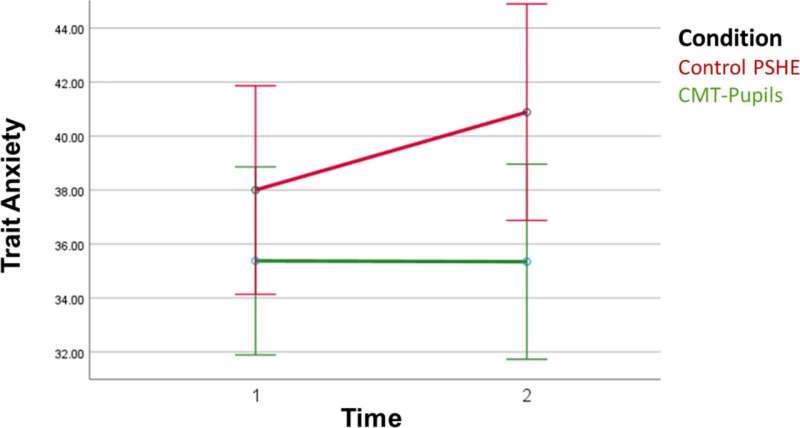This article has been reviewed according to Science X's editorial process and policies. Editors have highlighted the following attributes while ensuring the content's credibility:
fact-checked
trusted source
proofread
How compassionate mind training can support child mental health

Using compassionate mind training as a well-being intervention for school pupils could successfully support child mental health, according to new research by the University of Derby.
Researchers at the University have previously shown compassionate mind training (CMT)—an intervention that focuses on helping people be motivated to relieve their own, and others, suffering through different styles of thinking, feeling, and behaving—to be effective in supporting schoolteachers with their well-being.
Now, academics have applied the intervention in schools to see if it can be used to impact anxiety and depression in school children.
This initial research, the first to rigorously assess the impact of CMT on school pupils, has shown that the intervention could be a promising school-based well-being short curriculum for improving prosocial behaviors, the classroom environment and protecting against deteriorations in child mental health.
Professor Frances Maratos, professor of psychology and affective science, who is leading the research, said, "We know that mental health difficulties in children are increasing, especially following the transition from primary to secondary school, as this is one of the most stressful events in a child's life and can have a negative impact on both well-being and academic achievement."
"In an attempt to mitigate the risk of these difficulties, proactive well-being interventions are being increasingly explored in school settings. However, few focus specifically on this transition period."
"We wanted to apply our expertise and knowledge of CMT, which we have trialed successfully with teachers previously to positive effect, and adapt it for school children at this vulnerable period of their lives as a proactive approach to their ongoing well-being."
In the research, which has just been published in the Mindfulness journal, 67 children aged 11-12 took part in either Personal, Social, Health, and Economic (PSHE) lessons as usual or CMT as their PSHE lessons, over a five-week period.
The lessons included an understanding of emotion systems of the brain and body, including processes of emotion regulation to inform a child's emotional literacy, as well as practices to aid in coping with difficult emotions.
A further aim of the lessons was to introduce pupils to the concept of compassion and how this involves self-compassion, accepting compassion from others and engaging in compassion towards others, with practices introduced to increase all of these flows.
The trial, using a mix of methods, was designed to explore the implementation and effectiveness across several well-being parameters including anxiety, compassion, perfectionism, moods and feelings, self-esteem, emotional literacy, including anxiety, compassion, perfectionism, moods and feelings, self-esteem, emotional literacy, and prosocial behaviors.
Pupils reported positively on their experiences of the CMT lessons, and the research showed benefits for pupil and classroom behavior, including improved emotion regulation, kindness to others, and feelings of inclusion. Benefits were also found to extend to the class teachers.
Professor Maratos added, "This initial research has shown that CMT could be a promising school-based well-being intervention. Following promising indications from our initial research, we are now rolling out a revised six-lesson version of the intervention in more schools, increasing sample sizes and replicating results. We are also currently exploring the option of teachers and other trained professionals leading the program."
Professor Maratos is now working with Mindfulness Wales and the Camden Mental Health Support Team (within Tavistock and Portman NHS Foundation Trust) to expand the trial of the lessons and their delivery by others.
Commenting on the impact of the lessons, Liz Williams, one of the Mindfulness Wales trainers who is currently working with a school on the project, said,
"The nine- to 11-year-olds I've been teaching have been excited and even relieved when they recognize that how they are feeling is part of how their minds and bodies work. This gives them a basis to be kinder to themselves and apply the practices they've learned."
Kate Edwards, head teacher of Malpas Court Primary School in Newport, also involved in the ongoing Welsh trial, added, "Pupils were able to reflect on their own daily lives and identify which emotions of the different systems of mind they are experiencing. The skills pupils have learned during the sessions have continued to be useful across a range of situations, e.g., using body language to improve confidence when public speaking."
The University of Derby has been conducting CFT (compassion-focused therapy) and CMT research since the early 2000s, and its world-renowned research team has developed compassion-based interventions as effective treatments for a wide range of populations.
More information: Frances A. Maratos et al, A Mixed-Methods Study of Compassionate Mind Training for Pupils (CMT-Pupils) as a School-Based Wellbeing Intervention, Mindfulness (2024). DOI: 10.1007/s12671-024-02303-y


















